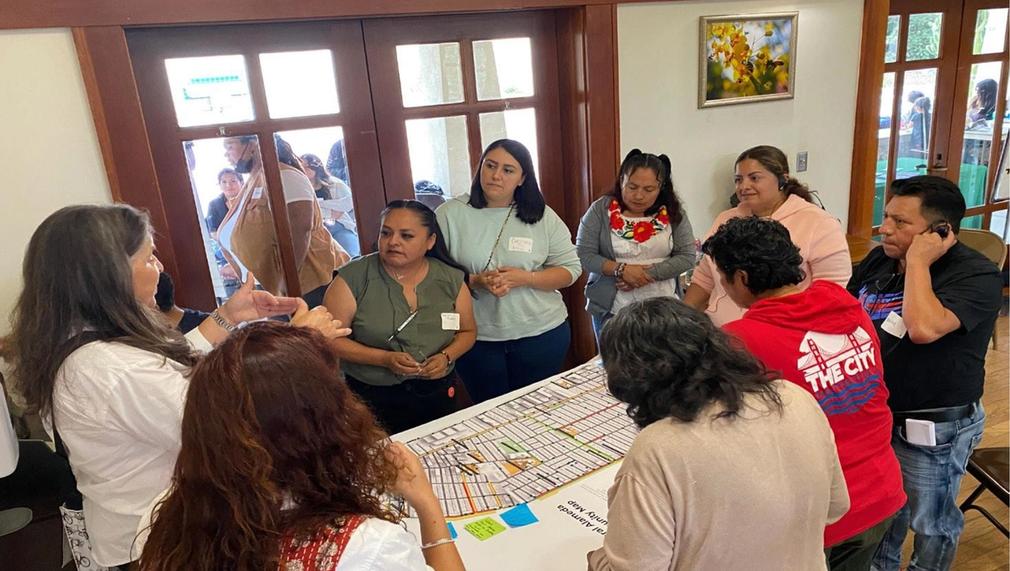MyTreeLA: Growing Community Through Trees
MyTreeLA App is a tech-meets-community project that brings tree tracking and storytelling into the hands of local residents. Our pilot project - Roots & Fruits: Greening Jefferson Park, where 100 fruit trees, distributed by SLATC, will be tagged with a QR code linking to a living digital record. Residents will scan their tree to report health, growth, fruit yield, and share personal stories and photos. SLATC will track survivability and environmental benefits. This is citizen science, community pride, and climate resilience—rooted in South LA.

What is the primary issue area that your application will impact?
Green space, park access, and trees
In which areas of Los Angeles will you be directly working?
South LA
In what stage of innovation is this project, program, or initiative?
Pilot or new project, program, or initiative (testing or implementing a new idea)
What is your understanding of the issue that you are seeking to address?
South Los Angeles faces a legacy of disinvestment in tree canopy, food access, and climate resilience resulting in heat exposure, limited access to fresh produce and poor air quality. This lack of green infrastructure intensifies the urban heat island effect and reduces quality of life for residents in 90018—an area ranked in the top 10% on CalEnviroScreen for pollution burden and climate vulnerability. Tree removals for housing developments continues the widening of this disparity. Fruit trees, if supported, can offer critical relief—but they often require sustained care to survive. SLATC’s approach would use QR-tagged trees connected to the MyTreeLA, multilingual outreach, and storytelling to increase survivability and community ownership. SLATC believes tree care must be community-defined, culturally rooted, and centered in the neighborhoods most impacted by environmental injustice. (Link: LA Urban Forest Equity) (Link: South LA Trees Project Page – USC Dornsife Public Exchange)
Describe the project, program, or initiative this grant will support to address the issue.
MyTreeLA combines fruit tree distribution with community-powered data collection and storytelling. Each tree distributed will be tagged with a durable QR code that links to a digital record. Residents who receive trees will scan their tag to report basic information—such as tree health, growth, or fruit yield—and upload photos or stories connected to their tree. All QR materials will be available in English and Spanish. The Roots & Fruits: Greening Jefferson Park pilot will launch with 100 fruit trees given to residents who will also receive guidance on how to care for their tree, access QR system and contribute to a shared story archive. Youth volunteers will be trained to support outreach and digital documentation. SLATC will compile tree data and community stories into a public-facing report coupled with workshops and community events to support ongoing engagement while reflecting both the environmental and cultural impact of the project. MyTreeLA seeks to empower residents—not just as tree recipients, but as stewards, storytellers, and citizen scientists. It would increase long-term tree survival, build ecological literacy, and affirm cultural identity through food and land connection. As a model for equitable urban forestry, it would help LA shift from planting to truly sustaining a community-led urban forest. MyTreeLA will transform each resident and fruit tree into a living, reciprocal relationship tracked, celebrated and sustained by those invested in community.
Describe how Los Angeles County will be different if your work is successful.
Success means that 100 fruit trees not only survive—but thrive—in the hands of South LA residents who feel connected to their care. Residents will see their efforts reflected in the health of their trees, the food they produce, and the stories they share. The next generation of the community will gain experience in stewardship, outreach, and community storytelling. Through QR engagement, we will generate meaningful data about tree growth, survivability, and community participation that rarely exists for grassroots greening efforts. Beyond individual trees, success would look like stronger relationships—between people and the land and between residents and their local environment. MyTreeLA will demonstrate how equitable tree stewardship can be simple, affordable, and led by the very communities it’s meant to benefit—rooted in local pride, shared responsibility, and long-term impact. We aim to use this pilot to shape a replicable model for citywide equitable tree stewardship.
Approximately how many people will be impacted by this project, program, or initiative?
Direct Impact: 100
Indirect Impact: 400